all-on-x Dental implants in Szczecin poland
New smile in one day
High-Quality, Affordable Dental Care Just a Short Flight Away
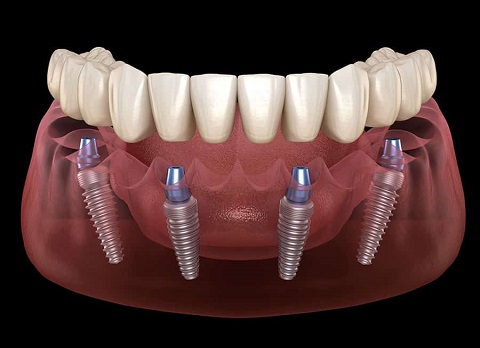
Who are implant-supported dentures for?
- Those with missing teeth that significantly hinder daily functioning
- Individuals with an unattractive smile causing low self-esteem
- People who find eating difficult due to missing teeth
- Those with current dentures that move, preventing enjoyment of favorite foods
- Individuals whose natural teeth don’t provide confidence in biting ability
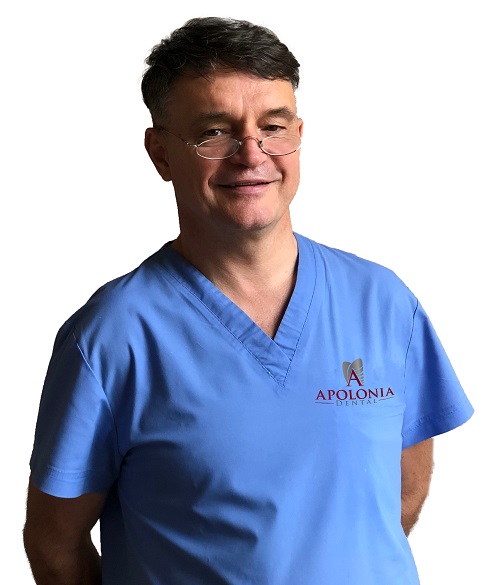
Implantologist and Dental Prosthetist
30 Years of Experience
Our surgeon has 30 years of experience in implantology, with over 4,500 dental implants placed and more than 1,000 satisfied patients.
Family-Owned Business
Unlike large dental chains, our dentists work for their own reputation. They dedicate the time needed to advise, make the right decisions, and achieve desired treatment outcomes.
Complete Services
We offer a wide range of dental services. Our team includes specialists from various fields to perform even the most challenging procedures, including sinus floor elevation and jawbone reconstruction when necessary. Moreover, we have an in-house dental lab using 3D Printing and milling technologies.
Special accommodation partnership
For out-of-town clients or those undergoing complex procedures, we offer complimentary hotel accommodation in the same building as our office as part of our comprehensive implant treatment package.
Our track record
Nasi lekarze wkręcili już ponad 4500 implantów zębów
Zmieniliśmy już wiele uśmiechów
One of the first clinics in Szczecin to offer dental implants
CONTACT US
Teeth in One Day
We specialize in same-day dental arch prostheses on implants.
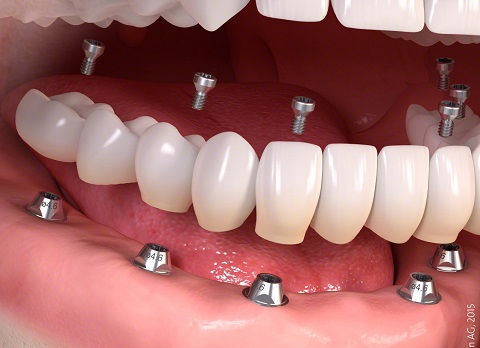
The process
We perform intraoral scans, photographs, and CT scans to assess the number of implants needed, their positions, and the type of prosthetic teeth required. We insert 4 or 6 implants into the dental arch, depending on the chosen method. The visit concludes with the placement of temporary teeth on the implants.
The benefits
- Improved aesthetics and self-confidence
- Better functionality for eating and speaking
- Stable and comfortable fit
- Long-lasting solution
- Preserves jawbone health
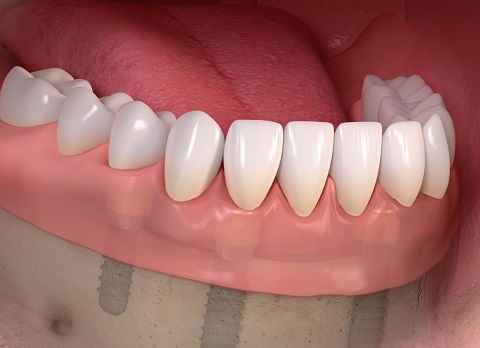
treatment advantages
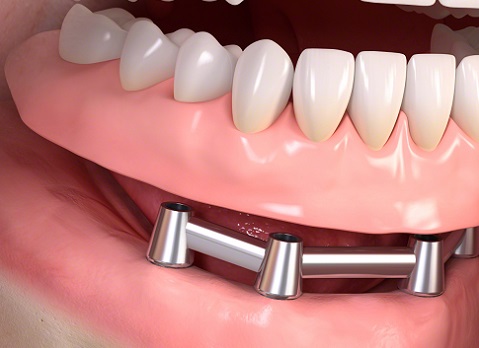
This is the best option for complete tooth loss (edentulism):
- The position of implants is planned digitally, which minimizes the surgery time, thus reducing patient discomfort.
- The procedure is possible even in the most challenging bone conditions. In most cases, bone reconstruction is not necessary due to the angled placement of implants.
- The teeth are screwed onto the implants, looking and functioning like natural teeth.
- The teeth are made from highly aesthetic materials, either porcelain or PMMA, depending on the patient’s choice, ensuring both comfort and aesthetics.
Other solutions
Implant-supported dentures can use one of 3 attachment methods. Here’s how they work:
Implant-Supported Denture
This is the most popular solution. Implants provide stability for the denture, allowing for natural chewing and biting functions. The denture is permanently installed by a surgeon using special fixing screws.
Removable Denture
A removable denture is placed on special attachments that allow the denture to be inserted and removed. This solution lets the patient enjoy the benefits of an implant-supported denture – stability and durability – while also being able to maintain the best possible hygiene of the gums and denture.
Bar-Supported Denture
A denture attached to a Dolder bar is the most stable denture attachment system. The clips stabilizing the denture are on the bar, which is screwed onto the implants. This solution provides the denture with the greatest stability.
Patient Testimonials

Our google reviews
Dental Implants - Step by Step
1
Implant Consultation
The first visit is a consultation, during which we perform intraoral scans, photographs, and a CT scan. Based on this data, we assess: the number of implants needed and their positions, necessary procedures, and the type of screw-retained teeth. Then we send a cost estimate via email.
2
Treatment Planning
The next visit is the final consultation about the ready treatment plan and answering any questions from the patient. We establish details, explain the adopted methods, and describe the procedure step by step.
3
Implant Placement
This visit involves the surgical placement of implants in the bone. Depending on the chosen method, we implant 4 or 6 screws in the dental arch. The visit ends with the placement of temporary teeth on the screws. Finally, the patient receives new teeth in one day.
4
Check-up and Suture Removal
When the implant sites have healed, we remove the sutures placed on the gums and perform a general post-operative check. We examine how the sites have healed and advise on the best hygiene methods for the new teeth.
5
Final Prosthesis Placement
Three months after the procedure, we replace the temporary teeth with highly aesthetic permanent teeth, i.e., the final prosthesis.
6
Hygiene Visits
For patients who want to take maximum care of their new teeth, we recommend hygiene visits, which we conduct every 6 months. During these visits, we take care of not only the prosthesis and screws but also the gums.
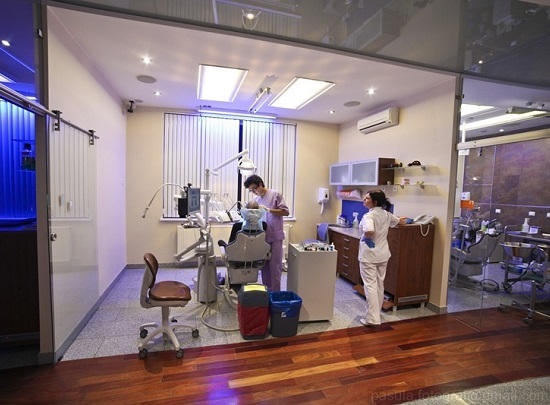
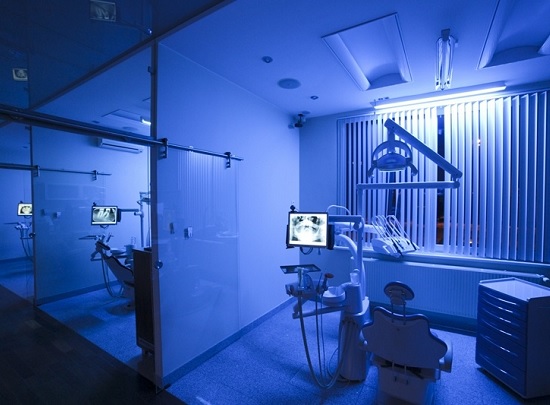
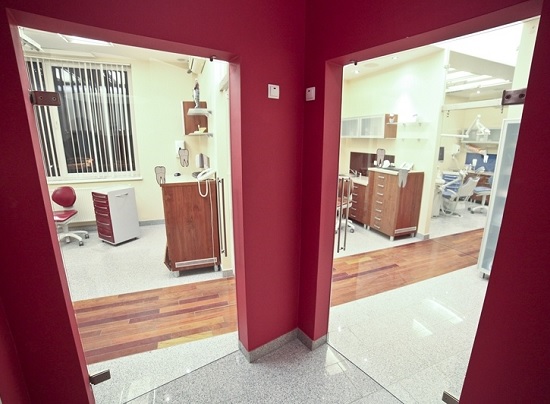
Our Clinic Tailored to Your Needs
- Dental implants
- Crowns and bridges
- Dentures
- Veneers and Bonding
- CBCT and X-ray
- Teeth whitening
- Root canal treatments
- Surgical tooth extraction
- Orthodontic aligners
- Periodentologia
FAQ
Implant-supported dentures were developed in the 1990s by Portuguese dentist Dr. Paulo Malo. They were first used in 1994 on a patient who had lost all teeth in the upper jaw. Since then, this method has become one of the most popular ways to restore missing teeth using implants. Implant-supported dentures are particularly useful for people who have lost all their teeth or need to replace them entirely, as this method allows for quick teeth restoration and improved oral function. Implant-supported dentures are also very effective for patients with limited bone in the jaw or mandible, as this technique allows for angled implant placement, avoiding the need for additional procedures such as bone reconstruction or sinus lifting.
Implant-supported dentures are made from various materials, depending on patient preferences and doctor recommendations. Here are some materials used for implant-supported dentures:
- Acrylic: Acrylic is a light and durable material often used for implant-supported dentures. Acrylic dentures are relatively inexpensive but may be less durable than other options.
- Metal and acrylic mixture: These dentures combine the advantages of metal and acrylic, making them durable and lightweight at the same time.
- Porcelain (zirconia): Porcelain dentures are very aesthetic and look natural, but they are also very hard and brittle. In specific cases, this can be a problem. For patients with parafunctions, this material will transfer bite forces directly to the implants. There’s no cushioning, as the material has very little flexibility.
- Composite: Composite dentures are made from a mixture of plastic polymers and quartz particles, making them durable and aesthetic.
- Light-cured UDMA polymer: This is the most modern material used for implant-supported dentures. It’s an excellent compromise. It’s flexible, durable, and aesthetic while being a budget-friendly solution.
Remember that each material has its pros and cons, and the best option for a given patient will be determined individually by the doctor. Sometimes, the best option may be to use one material for the upper jaw and another for the lower jaw. It’s important to discuss the various options with your doctor in detail and choose a material that best meets the patient’s needs and expectations.
Implant-supported dentures are one of the fastest ways to treat edentulism. Compared to traditional implant restorations, this method is much shorter and extremely effective. New teeth are placed in one day. These methods free patients from the need for complicated procedures that often must precede regular implantation. Implant-supported dentures are one of the more popular ways to treat missing teeth and can be especially useful for people who have lost most or all of their teeth and want to replace them. Here are several reasons why you should consider this method:
Durability and aesthetics: Implant-supported dentures are very durable and can last for many years. Thanks to their special shape and the use of modern materials, these dentures are also very aesthetic and don’t differ much from natural teeth.
Functionality: Implant-supported dentures allow for normal eating, speaking, and teeth brushing, which is especially important for patients who have lost most of their teeth.
No need to wear removable dentures: Unlike removable dentures, implant-supported dentures are fixed and don’t need to be removed for cleaning or at night.
Shorter treatment time: The procedure is usually shorter than other methods of treating missing teeth and can be done in one or several stages.
Improved quality of life: With implant-supported dentures, patients can regain confidence and comfort while eating, speaking, or smiling. This can significantly improve their quality of life.
Remember, however, that the procedure is complex and requires specialized dental care, so it’s important to choose an appropriate dental office and experienced doctors.
Implant-supported dentures are a dental procedure that involves placing dental implants in the jawbone and then attaching a dental prosthesis to them. This method is an effective way to restore missing teeth, but its cost can be quite high. The price of the procedure depends on many factors, such as:
- Type of procedure: The price may vary depending on the type of procedure, such as treatment in the upper or lower jaw, or both jaws simultaneously.
- Number of implants: The price may also depend on the number of implants being placed. The more implants placed, the higher the cost of the procedure.
- The doctor performing the procedure: The price may also depend on the experience and reputation of the doctor performing the procedure.
- Material costs: The price may also include the costs of purchasing materials such as dental implants and dental prostheses. Various implant companies are available on the market, differing in price. Additionally, it may be necessary to use additional materials such as bone substitute material, dissolvable/non-dissolvable membrane for bone reconstruction, a centrifuge for spinning a special part of the patient’s own blood to accelerate healing, tissue glue, and many others.
Generally speaking, the price of implant-supported dentures can range from several thousand to even tens of thousands of zlotys, depending on the factors mentioned above. It’s important to carefully check all options and compare prices from different clinics and doctors before deciding to undergo the procedure.
Implant-supported dentures are a specialized dental procedure during which the doctor places special implants in the lower or upper jaw, on which fixed dentures are later attached. It’s worth choosing a dental office where doctors have appropriate experience and qualifications to ensure that the procedure will be performed correctly. It’s also worth checking if the office has modern equipment and materials that will ensure the durability and quality of the prosthetic restoration. As for specific dental offices that offer implant-supported dentures in Szczecin, I recommend conducting your own research and comparing offers from several different offices. You can, for example, browse the websites of dental offices or contact them for detailed information. Remember that the decision to choose an office should be well-thought-out, as the procedure is complex and requires specialized dental care.
Yes, there are some contraindications to the procedure. As implantology develops, there are fewer and fewer of them. In fact, the contraindications for implant placement are:
- Osteonecrosis – a bone disease characterized by very poor healing
- Patients undergoing cancer therapy
- Very poor general health condition. In this case, the doctor decides whether to undertake treatment or use another method that bypasses surgical intervention.
However, there are no age-related contraindications. Anyone can undergo the procedure regardless of age. Remember that the decision to have implant-supported dentures always depends on the individual health condition of the patient and should be made after a thorough interview and examination by a dentist. It’s important to consult with a doctor and decide together on the appropriate treatment method.
As with any medical procedure, there is also a certain risk of failure with implant-supported dentures. Here are some reasons why the procedure may fail:
- Improper oral hygiene: Lack of proper oral hygiene can lead to infections and weakening of implants.
- Inadequate preparation for the procedure: If the patient does not follow the doctor’s recommendations for preparing for the procedure, e.g., does not stop smoking tobacco or does not follow an appropriate diet, this may increase the risk of procedure failure.
- Factors independent of the doctor or patient: According to various scientific studies, 1% to 5% of implanted implants fail, not integrating with the bone. In such a case, we repeat the implant placement, usually in exactly the same place. The procedure is shorter and does not require re-preparation of the site. We clean the place where the implant did not take and usually screw in a 0.5mm wider implant so that it anchors well in the site.
Remember that the decision to have implant-supported dentures should be well-thought-out and based on reliable information. It’s important to choose an appropriate dental office and experienced doctors to minimize the risk of procedure failure. If you have any doubts, it’s worth consulting with a doctor and deciding together on the appropriate treatment method. Like any surgical procedure, it carries the risk of soft tissue damage, bleeding, and temporary damage to sensory nerves. There are cases where the stabilization of implants is not sufficient to immediately place teeth on the implants after the procedure. In this case, we provide temporary, removable teeth.
- Quick teeth recovery: After the procedure, the patient can immediately use their new teeth, and the entire process usually takes only a few hours.
- Aesthetics: The new teeth look very natural, which improves facial appearance and positively affects the patient’s well-being.
- Durability: Implants are very durable and can serve for many years if properly cared for.
- Comfort: Dental prostheses attached to implants are more stable than traditional removable dentures, which increases comfort of use.
- Improved functioning: New teeth allow for proper chewing and speaking, which significantly improves the patient’s quality of life.
- No need to remove healthy tissues: Unlike traditional removable dentures, implants do not require the removal of healthy tooth tissues, which is particularly important for people with limited bone in the jaw or mandible.
Recovery after the procedure is individual for each patient and depends on many factors, such as the patient’s health condition, type of procedure performed, method of care, etc. However, the recovery period usually lasts about 2-3 weeks. During this time, the patient may experience mild pain and swelling and redness at the site of the procedure, but these are usually mild and subside after a few days. It’s important for the patient to follow the doctor’s recommendations and adhere to the recommended care method and diet to accelerate the wound healing process and minimize the risk of complications. In the first days after the procedure, the patient should avoid heavy physical work and intense exercise, as well as avoid drinking alcohol and smoking tobacco, as these factors can delay the wound healing process. Usually, after about 2-3 weeks, the patient can return to their daily activities, although some patients may need a slightly longer recovery period. It’s important for the patient to continue proper care of their new teeth and implants to ensure their durability and healthy appearance.
Proper hygiene is particularly important in the first days after the procedure when the sites after screw installation are still fresh. Lack of hygiene can carry the risk of inflammation or prolonged swelling. In addition to brushing new teeth, it’s also worth using mouthwashes, which will additionally reach narrow surfaces between the prosthesis and the gum. Here are some tips for maintaining hygiene after the procedure:
- Brush your teeth after each meal: After eating a meal, you should thoroughly brush your teeth with a toothbrush and toothpaste to remove food debris and bacteria.
- Use dental floss: Dental floss is particularly useful for dental prostheses attached to implants because it allows for thorough cleaning of the spaces between implants and the prosthetic restoration.
- Use an irrigator – it will help you remove food debris and bacteria from the oral cavity and reduce the risk of diseases around implants.
- Use interdental brushes: They are useful for removing food debris from hard-to-reach places in the mouth.
- Visit the dentist regularly: Regular check-ups at the dentist will help maintain proper oral hygiene and prevent the development of periodontal diseases.
- Remember about a proper diet: A diet rich in vitamins and minerals is important for maintaining oral and dental health. Avoid eating sweets and products high in sugar content.
Our specialists will inform you about the best hygiene methods for your new teeth, and at each visit, they will examine the condition of your oral cavity.
An alternative to implant-supported dentures is a procedure with the insertion of individual dental implants and dental prostheses or dental bridges on implants. The procedure of inserting individual implants involves inserting dental implants into the jawbone and then attaching a dental prosthesis or dental bridge to them. This method is effective in the case of missing individual teeth or several adjacent teeth. The disadvantages of this method are longer treatment time and the need to remove healthy tissues if there is not enough bone in the place where the implant is to be inserted.
Another option is the use of removable dentures, such as acrylic dentures or skeletal dentures. Removable dentures are less durable and aesthetic than dental prostheses attached to implants, but they are also cheaper and easier to maintain.
The decision to choose the appropriate method of treating missing teeth depends on the individual needs and expectations of the patient and the health condition of the oral cavity. It’s important to discuss all options with your doctor in detail and choose a method that best meets the patient’s needs.
book a free consultation call
Our location - just 20 minutes from the Szczecin airport
ul. Gryfińska 62A,
70-352 Szczecin
our blog
Dental Implants in one day
Zabieg wszczepienia implantów zębów to w umysłach większości z nas skomplikowana operacja stomatologiczna, która wymaga od nas co najmniej kilku wizyt w gabinecie specjalisty…
Full-Arch Dental Implants – 4 Implants or More?
The lack of even one tooth can be a cause of discomfort for us. The lack of several is a functional problem, as well as a psychological issue for many of us…
Implant-Supported Dentures vs. Traditional Dentures – Which to Choose?
Removable dentures or implant-supported dentures? What to choose? What are the advantages and disadvantages of both solutions?
Implant Abutments – Implant-Supported Dentures or Dolder Bar-Supported Dentures
Implant abutments are elements used in implant dentistry…



